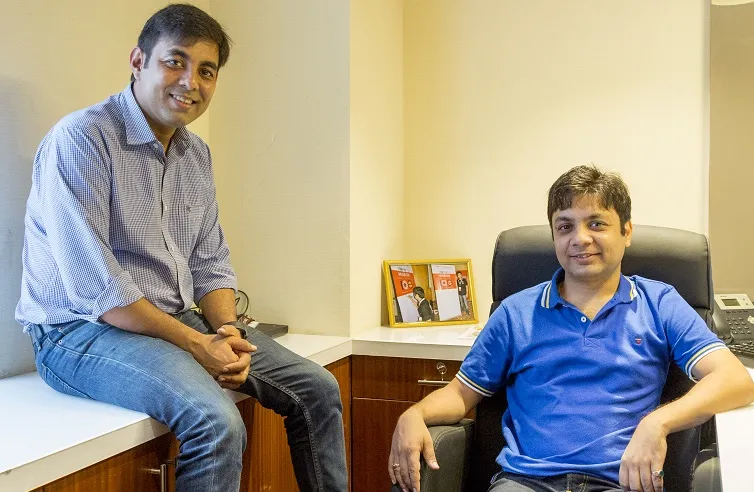Making sustainable automobile classifieds product from Jaipur: CarDekho’s story

While raising capital and diluting equity are hailed as the cool and logical way to build business for new-age startups, brothers Amit and Anurag Jain of CarDekho prefer to dilute less and are still on the way to building a scalable business. “Once, a veteran entrepreneur told me that 80 per cent of new-stage startups don’t know the perfect time and terms of raising institutional capital. This turns out largely to be true in the current scenario,” says Amit (38).
Today, the success of any startup is largely evaluated on frequency and the amount of funding it attracted.
Bootstrapping in initial years helps you learn frugality and dilute less
Drowning in a frenzied desire to scale, founders of VC-funded startups often end up diluting a major chunk of their equity, and, hence, control on the company. So far, Girnar Soft that owns CarDekho secured over $65 million VC capital over two rounds; still Amit and Anurag hold over half of the company. Amit adds,
We launched CarDekho in 2008 and bootstrapped till 2013. Bootstrapping for the first three to five years gave us a chance to dilute less and negotiate better with investors on our own terms.
The duo was making decent profit through the IT outsourcing business unit of Grinar Soft. “We started as an IT outsourcing company in late-2006 and were generating substantial revenue. This revenue helped us not to raise VC capital early and bootstrap CarDekho for five years,” says Amit.
CarDekho raised $15 million from Sequoia Capital in 2013. Amit and Anurag are IIT-Delhi alumni. Amit worked for Austin-based Trilogy for over eight years while Anurag had a brief stint at Sabre Holdings before Girnar Soft.

CarDekho never advertised on television and Amit believes that the lack of RoI and real impact discouraged them to buy expensive ad spots on prime-time television shows. However, he recognises it as a potent medium of mass branding.
Being frugal helps businesses sail through bad weather. Despite the global economic slowdown during 2008-2009, Cardekho remained unaffected without VC backing. “I had tried different businesses and failed miserably till our IT outsourcing unit took good shape. Failures had taught me the importance of not losing focus on unit economics and being frugal,” says Amit, adding that he does not believe in burning resources and then monetising later.
CarDekho owns 25 per cent volume of new as well as used-car segments
In 2011-12, Cardekho made a major chunk of revenue through advertising. However, it has now shifted its lead-selling to dealers. “We are more of a transaction-focused platform and thus creating a win-win situation for dealers and Cardekho,” adds Amit. The startup focuses on dealers (in both new as well as used-car segments) who own inventory. According to the brothers'estimate, India has about 15,000 dealers currently and over 40 per cent of them leverage their platform to drive sales.
The six-year-old company claims to enable 25 percent of the sales of organised, dealer-driven used cars. Delhi, Mumbai and Bengaluru are top three markets for Cardekho. “Demand from Tier-II and III cities have been picking up gradually. Cities like Jaipur, Indore, Rajkot and Guwahati are driving decent business for us,” says Amit.
While the used-car segment is touted to hold massive opportunity, the new-car segment contributes to 80 percent of Cardekho's business. “Used-car segment is going to be big in the coming years and we have been launching a slew of features to assist users in evaluating crucial check and balances of used four-wheelers,” says Amit.
At present, over three million used vehicles are sold and bought every year in India, but still a large fraction of the deals happen via the offline and unorganised market. “We dominate approximately 25 per cent of the online market for used vehicles,” adds Amit.
Rise of C2C platforms in automobile classifieds
Over the past one year,many classifieds marketplaces that focus on used cars, like Droom, Gozoomo and Spinny, made their debut, and investors also showed interest in them. On whether C2C is an area of focus for Cardekho, Amit says, “The space looks exciting but still in its nascent stage. We are keeping an eye on it but do not have any plans to enter it.” Sandeep Aggarwal's Droom closed a $16-million round led by Lightbox and others.
On the ZigWheels acquisition
Cardekho acquired Zigwheels in October for an undisclosed deal consisting of stocks. According to Amit, the acquisition turned out to be fruitful for the company from day one. “Zigwheels had significant traffic and by plugging it with our lead generation engine, we have maneuvered acquisition into a revenue-making proposition,” he adds.
For the brothers, acquisition makes sense only when there is convergence of synergy and vision. “I believe in frugality and intelligent business projection driven by data and logic. Zigwheels had various complementary propositions to drive the deal and such strategic fit can be welcomed even in the C2C space in the long term,” Amit explains.
‘Dekho connection’
Girnar Soft owns over dozen domain names with the ‘dekho’ suffix and currently operates various platforms having ‘dekho’ connection, mainly Cardekho, PriceDekho, BikeDekho, TyreDekho, CollegeDekho, among others. On the reasons for having startups in different verticals with the same suffix, Amit says, “In 2007-08, I bought several domain names having 'dekho' as suffix without any serious thought. However, it turned out to be a natural edge for us as ‘dekho’ gives wide and easy brand recall across the country.”
Consolidations squeezed battle between CarDekho and Cartrade
Consolidation over the last couple of years in the automobile classifieds niche had limited competition between CarDekho and Cartrade. Consolidation helps to weed out competition and curb burn rate. Poaching eachother's customers requires massive marketing cost. Mergers and acquisitions helped both CarDekho and Cartrade to have healthy and sensible competition.
Cartrade raised $43 million across two rounds and claims to have 9,000 new and used-car dealer partners.
Of unicorns and GMV
![[YS Lounge] 5 steps to build a billion-dollar unicorn](https://images.yourstory.com/cs/wordpress/2015/05/unicorn.jpg?fm=png&auto=format)
New-age startups valued at or over $ one billion are referred to as 'unicorns'. India currently has eight unicorns. However, Amit doesn’t understand how the unicorn club fares in real business fundamentals. “Most of the unicorns are overvalued. Look at their burn rate and bottomline. It doesn’t match up, I can’t understand this. Probably unicorns know it all,” says Amit.
He displays similar perplexity for GMV (gross merchandise value). “I don’t understand the relevance of GMV as far as platform play (except full stack model) is concerned. We never reported our revenue in GMV. In my opinion, GMV is a weak way to reflect or project business fundamentals,” Amit adds.
Startup pundits often opine that a clutch of startups are overvalued and, going forward, correction is bound to happen on valuation front. Amit says,
Yes I believe valuation achieved by a few companies isn’t real and sanity will prevail soon. Four years ago, raising capital for new ideas wasn't as easy as it is now and I am confident that raising money on unsustainable metrics for scale at any cost will reflect the memory of old times.







